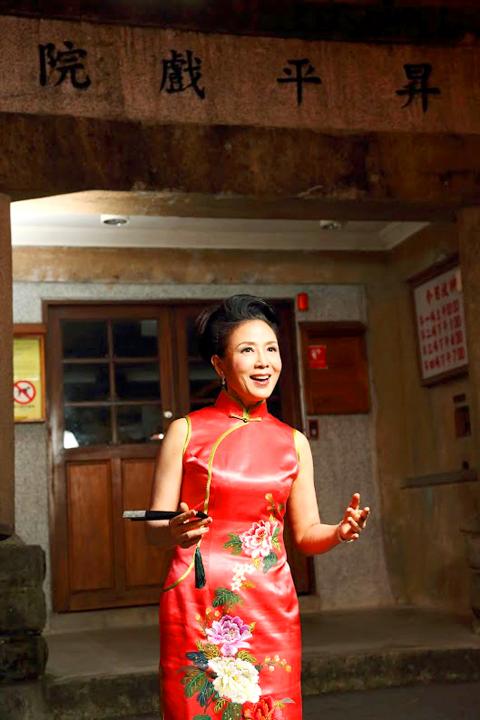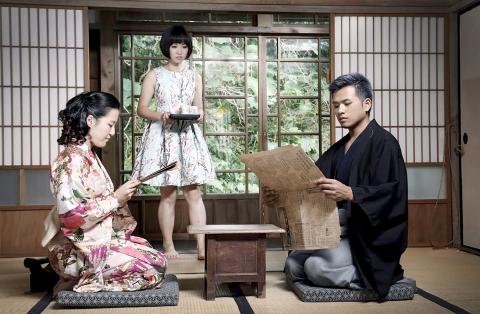Liu Ruo-yu (劉若瑀) has been best known in recent years for her work with the Zen-based drumming troupe U-Theatre (優人神鼓) that she founded in 1988 and the rather ascetic lifestyle it entails.
The company is renowned for its drumming, martial arts training system and its very long yunjiao (雲腳, “cloud feet”) walks — around Taiwan and in several other nations. It just held a three-day walk for young drummers early last month in Taitung County.
So pictures of Liu dressed in a bright red, flower-bedecked cheongsam, hair in a bun, might come as a shock to those who are used to seeing her in more simple cotton and linen outfits.

Photo Courtesy of U-Theatre
However, those who remember Liu from her days as one of Taiwan’s most prominent stage actresses with the Lan Ling Theatre — she won a Golden Bell in the early 1980s — are less surprised by the glamour shots for the company’s new show, Town of Gold (淘金去), which opens in New Taipei City’s Jiufen District (九份) on Friday next week.
Liu quit the stage to go to the US to study for a masters’ degree in theater arts at New York University. After graduation, she was selected to join a one-year-workshop in California led by famed avant-garde Polish director Jerzy Grotowski.
It was Grotowski’s challenge her to explore herself and her heritage that led her found U-Theatre upon her return home, and focus on more traditional Taiwanese folk rituals and music. She wanted to create theater works that would enable both the performers and their audiences to transcend conventional visions.

Photo Courtesy of U-Theatre
The company’s latest production, which is a big departure for U-Theatre, promises to do just that. It is a musical and its 21-member cast includes several actors, actresses and singers, in addition to Liu herself.
Liu and U-Theater were invited to create a show by the New Taipei City Cultural Affairs Bureau, which wanted to give visitors a better understanding of Jiufen’s history.
Company members spent about a year interviewing elderly residents of Jiufen and surrounding area, looking for stories about the town’s history, its culture and the changes it has seen, as well as collecting folk songs and once-popular tunes.
The show focuses on changes to the town during the Japanese era and after World War II and is largely told through the eyes of the women in the story.
While Liu’s skills as an actress focused more on straight theater, she said singing is something she enjoyed as a child, and she grew up listening to her father singing.
Town of Gold will be performed in Jiufen’s Shengping Theater (昇平戲院), which was built in 1914 during the Japanese colonial era. It was Taiwan’s first — and for the time, biggest — modern theater.
The Baroque-style building was renovated in 1961, but closed in 1986 amid the decline of the town’s mining industry.
The theater, like much of Jiufen, was highlighted in Hou Hsiao-hsien’s (侯孝賢) 1989 award-winning film A City of Sadness, which triggered a revival of interest in the town, and the theater became a popular backdrop for several commercials and other productions.
The theater was renovated and reopened as a cinema in September 2011. Now it will serve as the backdrop for a new telling of Jiufen’s story.
Jiufen is a bit off the beaten track for a theater production, but the town can be reached by bus No. 1062 from the Taipei Zhongxiao Fuxing MRT stop, or by a combination train/bus trip to the train station in Rueifang District (瑞芳) and then changing to bus numbers 788, 827 or 825.
Performance Notes
WHAT: Town of Gold
WHEN: Dec. 25 to Dec. 27, Dec. 30, Jan. 1 to Jan. 3, Jan. 6, Jan. 8 to Jan. 10, evenings at 7pm and matinees at 2pm
WHERE: Jiufen Shengping Theater (九份昇平戲院), at the intersection of Hsuchi Road and Chingbian Road, Jiufen, New Taipei City (新北市九份豎崎路與輕便路交接處)
ADMISSION: NT$800 and NT$2,000; available online at www.accupass.com/go/utheatre (phone: 02-8978-1001) or through U-Theatre at 02-2938-8188

Google unveiled an artificial intelligence tool Wednesday that its scientists said would help unravel the mysteries of the human genome — and could one day lead to new treatments for diseases. The deep learning model AlphaGenome was hailed by outside researchers as a “breakthrough” that would let scientists study and even simulate the roots of difficult-to-treat genetic diseases. While the first complete map of the human genome in 2003 “gave us the book of life, reading it remained a challenge,” Pushmeet Kohli, vice president of research at Google DeepMind, told journalists. “We have the text,” he said, which is a sequence of

On a harsh winter afternoon last month, 2,000 protesters marched and chanted slogans such as “CCP out” and “Korea for Koreans” in Seoul’s popular Gangnam District. Participants — mostly students — wore caps printed with the Chinese characters for “exterminate communism” (滅共) and held banners reading “Heaven will destroy the Chinese Communist Party” (天滅中共). During the march, Park Jun-young, the leader of the protest organizer “Free University,” a conservative youth movement, who was on a hunger strike, collapsed after delivering a speech in sub-zero temperatures and was later hospitalized. Several protesters shaved their heads at the end of the demonstration. A

Every now and then, even hardcore hikers like to sleep in, leave the heavy gear at home and just enjoy a relaxed half-day stroll in the mountains: no cold, no steep uphills, no pressure to walk a certain distance in a day. In the winter, the mild climate and lower elevations of the forests in Taiwan’s far south offer a number of easy escapes like this. A prime example is the river above Mudan Reservoir (牡丹水庫): with shallow water, gentle current, abundant wildlife and a complete lack of tourists, this walk is accessible to nearly everyone but still feels quite remote.

In August of 1949 American journalist Darrell Berrigan toured occupied Formosa and on Aug. 13 published “Should We Grab Formosa?” in the Saturday Evening Post. Berrigan, cataloguing the numerous horrors of corruption and looting the occupying Republic of China (ROC) was inflicting on the locals, advocated outright annexation of Taiwan by the US. He contended the islanders would welcome that. Berrigan also observed that the islanders were planning another revolt, and wrote of their “island nationalism.” The US position on Taiwan was well known there, and islanders, he said, had told him of US official statements that Taiwan had not